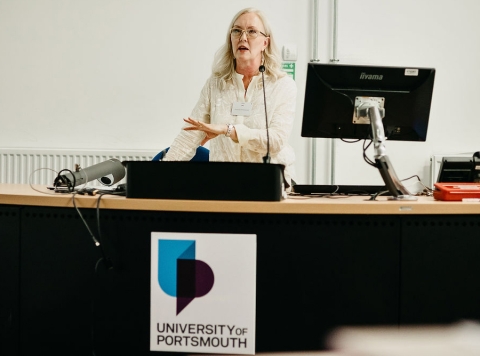

A series of crime prevention videos, which used virtual environments to study crime, launched this week
20 June 2019
2 min read
A series of crime prevention videos, which have pioneered the use of virtual environments to study crime, were launched to the public this week.
The Virtual Burglary crime prevention launch took place at a special event on Monday (17 June) to a select audience of staff and Crime Scene Investigators from Hampshire, Avon & Somerset and Surrey Constabularies, senior national and regional leaders of Neighbourhood Watch, staff from across the University and members of Portsmouth City Council.
The videos are based on interdisciplinary research, led by the University of Portsmouth, and using knowledge from experienced, convicted burglars who ‘re-enacted’ virtual burglaries. The results of the study, which was the was the first in the world to observe burglars as they scoped the neighbourhood, revealed a striking degree of knowledge and skill by experienced burglars in choosing which home to target, how to navigate inside and what to take, revealing unprecedented insight into crime prevention.
The videos show:
- clips involving ex-burglars re-enacting crimes;
- clips regarding crime prevention;
- the experience of the victim and rehabilitation of the offender;
- a walk through of the aftermath of the burglary for Crime Scene Investigator training.
- The project is led by Dr Claire Nee, Director of International Centre for Research in Forensic Psychology, who worked with Neighbourhood Watch and Hampshire Constabulary to develop this exciting project.
Dr Nee said: “We want to make the knowledge from the research available to a wide number of beneficiaries including organisations interested in crime prevention, Neighbourhood Watch and the general public.
“The research showed clear differences in the way burglars navigate and process information in the neighbourhood, compared to other criminals and non-criminals, which we will use to advise homeowners, the police and insurance companies in helping people protect themselves from crime.”
Dr Nee said the use of virtual reality to observe offenders undertaking residential burglary is reaping rewards, giving researchers precise crime prevention information.
“Understanding their expertise is key to protecting yourself from this kind of criminal,” she said. “If we know experienced burglars tend to always do A and then B and then C, on their journey to crime and then inside the property, we can plan our environment and homes to disrupt the burglar, by not having a predictable layout or high value zones, for example.”
